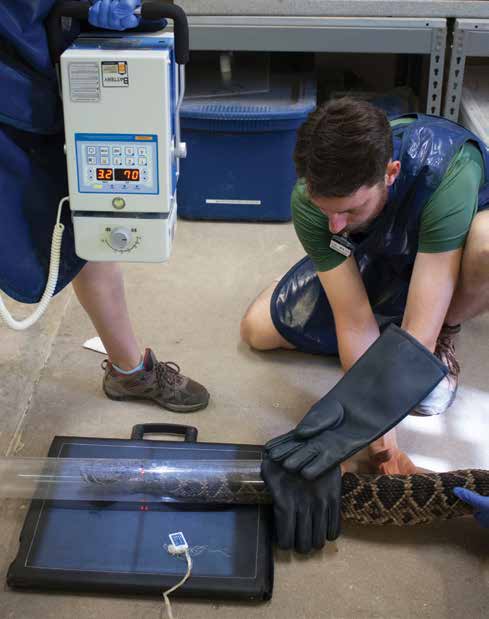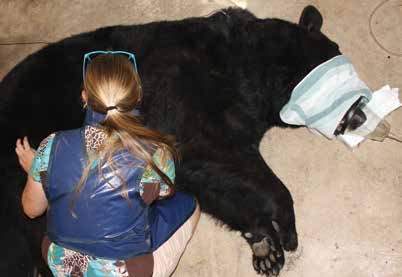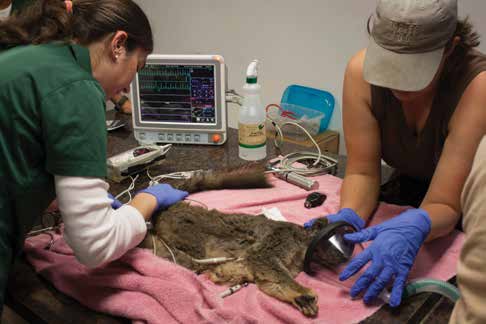A New Hospital FOR A HISTORIC GARDEN
 by Tim L. Tetzlaff
by Tim L. Tetzlaff
Naples Zoo Director of Conservation
Just as Naples has grown in population, so have healthcare options for area residents. The same is also true for the rare wildlife in Naples Zoo at Caribbean Gardens. Along with specialist consulting veterinarians, the Zoo now has both a full-time veterinarian and veterinary technician to monitor the health of the animals. And over the coming year, Naples Zoo is
greatly expanding its on-site medical facilities with the creation of a full veterinary hospital.
EQUIPPED TO CARE
Our wildlife needs have naturally outgrown the current modular facility. To remedy this, a multi-disciplinary team was formed to custom design the new hospital. While animal care staff had extensive experience at other zoos and their hospitals, other members of the team benefited from site visits to other zoo hospitals to explore the best of each and take advantage of lessons learned post-construction.
The result will be an all-new hospital able to care for animals in size from toads to tigers located on the northwest portion of the gardens. At nearly 7,400 square feet, the hospital enables a broad spectrum of care from outpatient procedures to areas where animals can live while receive ongoing care. And of course, the hospital includes a large surgical suite capable of handling one of those giant tigers. Additional space can handle well-animal check-ups and vet staff will also have a full lab to perform tests.
With a full complement of medical equipment to diagnose and care for these precious species, the new hospital streamlines care for a variety of species. An ultrasonic scaler provides dental treatment for lion-sized fangs. Microscopes and a full lab allow staff to rapidly run various tests plus blood work like chemistry panels and complete blood count (CBC) tests without losing time for off-site analysis.
A digital radiograph bypasses traditional film and allows instant views inside the animal. It’s also portable so our vet can do “house calls.” And on diagnoses where x-rays aren’t useful, doctors can use an ultrasound.
As Naples Zoo veterinarian Dr. Lizzy Arnett-Chinn explains, “This great expansion of the veterinary facilities at the Naples Zoo will not only allow for better overall health care, but also decrease the need to take animals off site for procedures. I am so lucky to be a part of this wonderful team and see this project from the ground up.”
 A PLACE FOR PANTHERS
A PLACE FOR PANTHERS
Beyond caring for the animals living in the gardens, the new veterinary hospital will be able to assist in caring for our iconic local panthers. As part of a cooperative effort with the US Fish and Wildlife Service and the Florida Fish and Wildlife Conservation Commission, Naples Zoo created an educational Florida panther habitat last year. This is now the permanent home for Uno, a panther that was blinded after being struck by two shotgun blasts. As part of this effort, the Zoo also opened a behind-the-scenes rehabilitation area for Florida panthers for injured or orphaned cats. The new veterinary hospital
is the second phase of this program as it provides panther biologists a single local location to quickly bring cats. Once on-site, panthers can receive both emergency procedures as well as any ongoing care from the Zoo’s veterinarian as well as other area specialty veterinarians.
As Naples Zoo President and CEO Jack Mulvena states, “Providing even greater healthcare for our animals is reason enough to be excited about this next step. The fact that we can combine that mission with increasing the available medical options for local endangered species makes it a perfect win-win.”
 COMBINING FOR COMMUNICATION
COMBINING FOR COMMUNICATION
Just like a parent is a doctor’s best source of information on a child’s ongoing symptoms, so keepers are a veterinarian’s best source of data for noting any irregular behavior that may indicate an animal isn’t feeling well. To ease this flow of information on animal health, the new hospital is also the hub for the Zoo’s professional keepers. An expanded meeting room can handle growth for the current daily meetings between the Director of Animal Programs, supervisors, keepers, and veterinary staff. Keepers will also have increased workstation space where they can input daily animal records and provide updates to the registrar.
HEALTHY GOALS
While we look forward to the completed hospital and expanded capacities filled with a sea of stainless steel and advanced medical equipment, the goal is not the building itself. Our goal is that bright look in an animal’s eyes telling you that all is well. And knowing that when those dark days arrive with their sad eyes, you’ve got the team and resources to heal them so they can live a long, healthy, and happy life. As animal lovers, we hope you enjoy seeing this new hospital being created as much as we do.
As this effort for our veterinary hospital funded by private donors comes to a close, we’re focusing on the next steps of our campus-wide campaign. If you are interested in learning more about the Naples Zoo’s upcoming mission-based projects, please contact Marci Seamples, Director of Development, at 239.262.5409 ext. 147 or marci@napleszoo.org to learn more about the joy of enriching the lives of these extraordinary animals, our community, and the natural world.
Far from the simple menageries of the past, today’s nationally accredited zoos are centers of learning and natural crossroads for biologists, educators, environmental scientists, and researchers – as well as for students, conservationists, and all animal lovers. Naples Zoo at Caribbean Gardens is an award-winning, private 501(c) (3) nonprofit serving wildlife and families here and around the world. More information at www.napleszoo.org.




Leave a Reply
Want to join the discussion?Feel free to contribute!